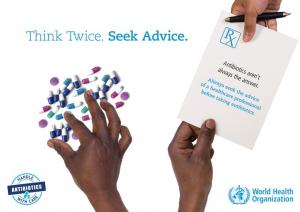World Antibiotics Awareness week commemorated in Ethiopia
13 December 2017, Addis Ababa - Ethiopia commemorated the World Antibiotics awareness week recently from 23rd - 29th of November 2017. The theme for this year was “Seek advice from a qualified healthcare professional before taking antibiotics”. The awareness week commenced by a panel discussion which was held at Ethiopian Public Health Institute in Addis Ababa on 23rd November 2017 and various activities were held throughout the week including press conference, short spot message through ETV and Radio. This panel Discussion was organized by EFMHACA, MOLF, EPHI, WHO, USAID / GHSC_PSM and CDC collaboratively with “one health approach” and it was started by a key note address of partners and higher officials from government stakeholders.
Antibiotics are medicines used to prevent and treat bacterial infections in humans and animals. However, Antibiotics are in danger of losing their effectiveness due to over-prescribing, misuse by patients and other factors contributing to prolonged and more expensive treatments and increased mortality. Thus, Antimicrobial Resistance (AMR) become one of the biggest threats to global health and development today, and is rising at alarming rates around the world. Thus, World Antibiotic Awareness Week is a global campaign that aims to raise awareness on the need to preserve the power of antibiotics through appropriate use; to make antibiotic resistance global and nation recognized health issue; to increase the recognition that individuals, health and agriculture professionals and governments must all play a role in tackling antibiotic resistance.
Dr Paul Manuika, Representative from WHO Ethiopia a.i. speaking in his key note address said that “Misuse of antibiotics puts us all at risk hence everyone should give high consideration in seeking advice from a qualified health professional before taking any antibiotics.” Dr Paul added that WHO will continue providing strategic support to the country as per the Global Plan of Action in prevention and control of Antibiotics Resistance and its readiness; working in collaboration with all stake holders in the same endeavor.
Dr. Scott Newman, Emergency Center for Transboundary Animal Disease Team Leader, The Food and Agriculture Organization (FAO) on his remark said that “Antimicrobials play a critical role in the treatment of diseases of farm animals (aquatic and terrestrial) and plants. Their use is essential to food security, to our well-being, and to animal welfare. However, the misuse of these drugs, associated with the emergence and spread of antimicrobial resistant micro-organisms, places everyone at great risk“. He added that FAO adopted a Resolution on AMR on 2015 and developed Sustainable Development Goals the implementation plan that supports the WHO-led Global Action Plan that aims to assist Member States to develop and implement multisector National Action Plans to combat AMR; and FAO will continue to work closely with partners in Ethiopia and abroad to mitigate potential impacts of overuse of antibiotics in the animal health, public health, and aquaculture sectors.
Mr Yehulu Denekew, Director General of FMHACA in his opening speech highlighted the importance of the World Antibiotics Awareness week that Ethiopia is undertaking now and the collaboration effort that helps to bring the anticipated change.
Presentations were made and discussed by a panelist from WHO, FAO and AMR Committee on Antimicrobials resistance: Global Magnitude, Impact and Evidences, One health approach in the prevention and containment of AMR and AMR prevention and containment and AMR surveillance study Report in Ethiopia respectively which was moderated by Dr Berhanu Amare from CDC and Dr Admassu Tena from Addis Ababa University.
Recent study shows that, 50% of antibiotics are prescribed inappropriately and 50% of patients have poor compliance as a result, the medicines become ineffective and infections persist in the body, increasing the risk of spread to others.
A press conference led by EFMHACA, WHO and ARM committee was organized to brief media in order to engage them in making awareness to the wider community. The panel discussion was concluded with recommendations and to collaboratively work with one health approach.
